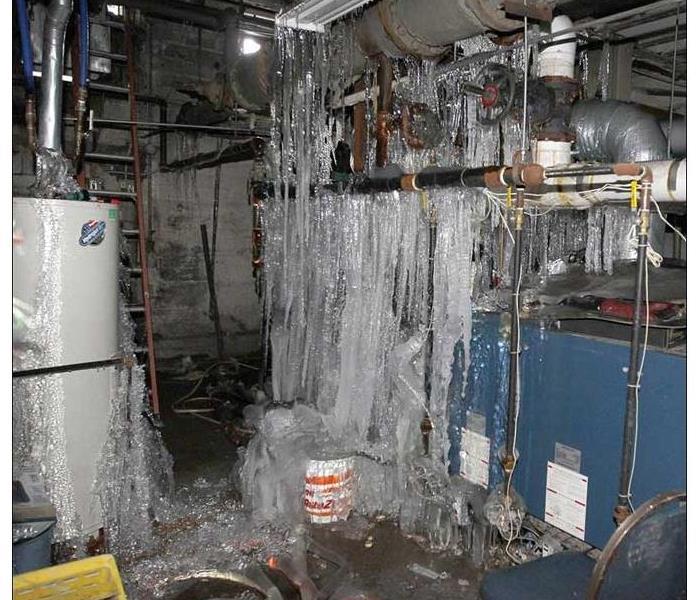Frozen Pipes
12/7/2021 (Permalink)
An all too common problem in the cold winters of Northwest Iowa is frozen pipes. Some of the most costly damage in homes is when there is a burst pipe in the upstairs and the water seeps down to the first floor and basement.
When water freezes it expands, which creates pressure on whatever is containing it. Pipes that are exposed to severe cold or located near exterior walls that have little to no insulation are more likely to freeze. Exposed pipes are generally found in unheated basements, crawl spaces, garages, attics, or kitchen cabinets. The best way to deal with freezing pipes is to prevent them in the first place.
Prevention:
- Keep water faucets running. When it is extremely cold outside, always keep one or two faucets running slowly. Water moving through the system will help prevent the line from freezing.
- Direct warm air to cold areas of your home. Often, pipes that freeze are located near an outside wall or window, so be sure to direct warm air to the colder areas of your home.
- Leave cabinet doors open. Kitchen sinks are usually on an outside wall. Be sure to leave cabinet doors open to allow warm air to into the cabinet. During cold weather it is good to leave your kitchen faucet on.
- Disconnect your hose from the outside faucet. If you leave your hose connected, water will not be able to drain out of your hose and it will freeze and break the device.
- Install heat tape. You can find heat tape at most local hardware stores. Installing heat tape will warm pipes as needed during cold weather. Consult a plumber if you have questions on installation.
- Seal any leaks that allow cold air into your home where pipes are located. Check electrical wiring, dryer vents, and pipes for air leaks. You can use caulk or insulation to keep cold air out. A tiny opening can let enough cold air in to freeze pipes during severe weather.
- Prevent the temperatures from dropping below 32 degrees in any area of your home.
- Call a licensed plumber to locate potential pipe bursts and prevent them from happening.
What to Do if a Pipe Burst:
- Turn off the main. Before anything else, make sure to turn off the water supply. Do not turn the water back on until a plumber says you are able to.
- Call a licensed plumber. Calling a plumber immediately will help minimize the damage.
- Clear away water quickly to avoid excess water damage. Water damage is inevitable when pipes burst, but the sooner you clean the water, it is less likely you will experience irreparable damage to your possessions. The longer the water stays, increases the chances of mold growth.
- Drain your faucets to remove the water left in your system. Water removal will take some pressure off your pipes and helps ensure they are dry. Flush toilets multiple time to drain the water.
- Frozen pipes must warm slowly to prevent any further damage. Turn up the heat in your home. If this isn't enough you can use a hair dryer to warm the pipes.
- To circulate warm air, keep doors open. Rooms that contain exposed pipes need more air circulation to dry the pipes and surrounding area.
For anyone experiencing water damage, call SERVPRO of Spencer & Iowa Great Lakes. Our 24-hour emergency crews will work quickly to restore your home or business. Our goal is to stop the damage from spreading because we understand that time works against a structure when water attacks. We have state-of-the-art equipment that allows us to dry the damaged area quickly and efficiently.






 24/7 Emergency Service
24/7 Emergency Service
